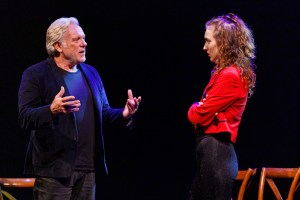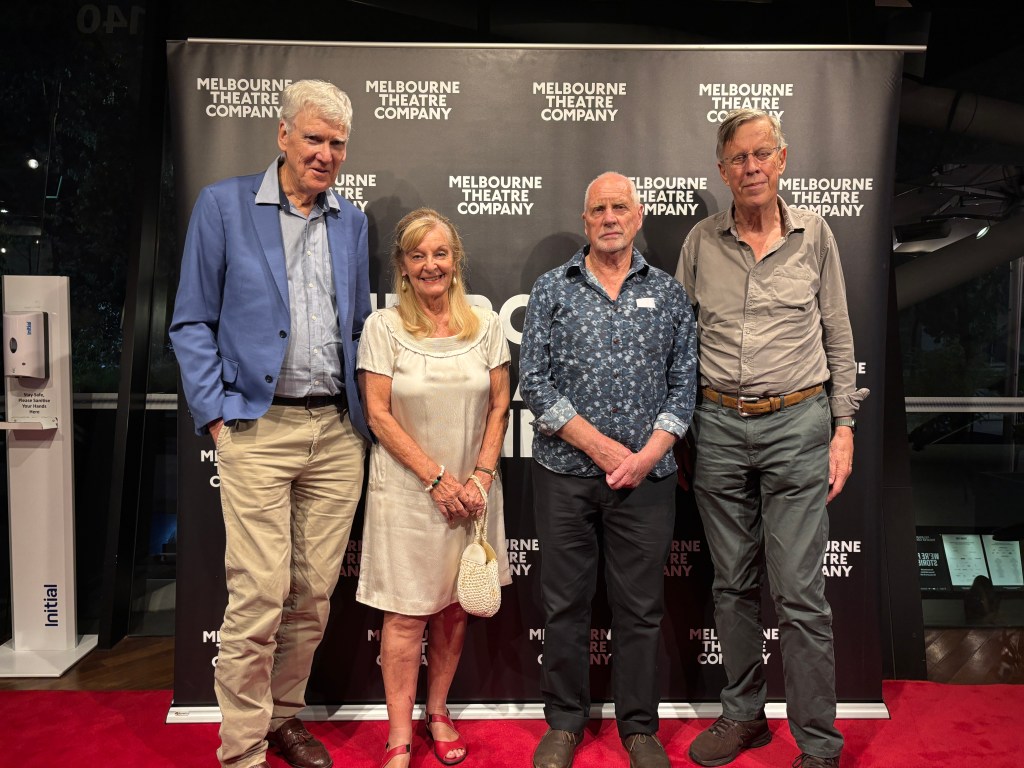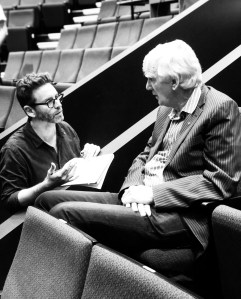When it comes to Aussie theatre, David Williamson is the GOAT
Almost 60 years since his first play hit stages, David Williamson continues to sell out seasons all over Australia, confirming the acclaimed playwright is as relevant as he always was.

The careers of most Australian playwrights have uneasy parallels with those of the diggers depicted in the 1981 film Gallipoli – brave innocents who storm into a hostile environment, try to secure a beachhead, face immediate counterattack from a well- resourced enemy, attempt to hang on for dear life, make small gains, but ultimately get slaughtered.
After all, even successful stage plays in Australia get banned (Rusty Bugles), receive bomb threats (The One Day of the Year) or turn out to be one-off flukes for its author (The Elocution of Benjamin Franklin, Summer of the Seventeenth Doll).
It’s no wonder most playwrights eventually give up and go into something more welcoming, like television, novel writing, communications, academia and/or alcoholism.

Which makes the achievements of David Williamson – who wrote the screenplay for Gallipoli – even more remarkable. This year saw the world premiere of his most recent stage play, Sleeping Dogs, which by one count is his sixty-second, although it’s hard to pin down an exact number.
Does Jugglers Three and its reworking, Third World Blues, constitute one play or two? Does his adaptation of Shakespeare’s King Lear count as one or a half? And this doesn’t include his revues, sketches, screenplays, unproduced plays, articles, memoirs and angry faxes sent to critics after one too many glasses of red.
Regardless of exact figures, Williamson is undoubtedly not only the most prolific and popular Australian playwright of his generation, he’s one of the most prolific and popular writers in Australia’s history.
What does this six-foot-seven (200.66cm) former GM Holden engineer from Bairnsdale in eastern Victoria have that is so special? For starters, he was lucky in the lottery of life.
He may not have felt like it at times, with two warring parents traumatising his childhood, but Williamson was born a white male, which always helps. He was part of a generation able to find work, education and real estate relatively easily, however many times Boomers try to turn their upbringing into the first part of David Copperfield (no judgement, every generation gets stricken down with “Four Yorkshiremen comedy sketch disease” sooner or later).
You might like
In the late ’60s Williamson was able to do a not too hard but interesting job (university lecturer) that paid enough for him to raise a family and buy a house, while still giving him time to write – a concept that has basically vanished in today’s society.
It helped, too, that he came from a social class who dominated theatre-going in Australia – university educated, white, bourgeoisie, materialist, poly curious
Moreover, Williamson came of creative age when, for the first time in history, it became a little easier to produce Australian plays on stage. His first full-length work to be performed, The Indecent Exposure of Anthony East, was written in 1967, the year the Australia Council was announced and drama quotas were introduced on Australian commercial television. The period after that saw a significant infusion of government funds into the arts, particularly under prime ministers John Gorton and Gough Whitlam. Williamson was perfectly poised to benefit.
It helped, too, that he came from a social class who dominated theatre-going in Australia – university educated, white, bourgeoisie, materialist, poly curious. (Just as Neil Simon was greatly assisted throughout his career by coming from the same background as the bulk of the Broadway-attending audience in New York – Jewish, white, aspirational, conservative.)
Williamson spoke to his audience and their concerns with insight, humour and empathy. In return, they responded with delight and long-term loyalty. Still, plenty of other playwrights had these advantages, yet it was Williamson who leapt out from the pack early and stayed there. Why?

Well, he’s always been super productive – the easiest thing to do in the world is not write, but Williamson is a self-confessed compulsive author who never stops cranking out the pages. Indeed, I’m guessing he’s on some sort of spectrum, like a lot of engineers, but that’s useful for writers. He’s constantly practising his craft, and forever has some project on the go.
His plays were/are always clear – you’re never in doubt what is going on and why. He tells stories with a beginning, middle and end, and is rarely predictable in his narratives. He can be very funny and isn’t afraid of emotion. He can be hugely insightful on the worlds he knows well – not just the chattering classes and their slimy colleagues who inspire the majority of his characters, but also their grumpy war generation parents and underachieving children. He writes a lot about families, a universal subject matter (everyone has one).
He maintains a healthy amount of interest in the world. While some Williamson plays feel like they’re cobbled from opinion pieces in The Age, he usually does his homework on the fields where his stories take place (academia, community conferencing, new tech, media, etc).
He experiments with new ideas and formats – cabaret (Rupert), semi-musicals (Lotte’s Gift), historical dramas (Nearer the Gods) – but can always rely on his ability to turn out a solid naturalistic comedy. His success and work ethic has shielded him from the relentless negativity (from theatre managements, bureaucrats, governments, critics) that prematurely ends most Australian playwright’s careers.

He kept up a solid stream of masterpieces though the 1970s and ’80s that are deservedly endlessly revived – The Removalists, Don’s Party, Travelling North, The Club, Emerald City.
Subscribe for updates
He learns from his misfires – for instance, his poorly received film satire Celluloid Heroes (which, actually, is quite fun) led to the triumph of Emerald City, possibly the greatest defence of Australian culture ever written. He’s not afraid of big targets, like government corruption (Sons of Cain) and News Corp (Rupert).
He benefitted from a sideline as a screenwriter relatively early – Stork, Petersen. He earned credits on some internationally renowned Australian movies (Gallipoli, The Year of Living Dangerously, Phar Lap) that led to a series of lucrative – if unfilmed – Hollywood assignments than assured his financial independence. Through the 1990s and early 2000s he deftly alternated between bright social comedies (Money and Up For Grabs) and gut-punching dramas (Sanctuary, After the Ball, A Conversation).
Around the mid-2000s his output became increasingly variable. The skills remained – especially the ability to craft narrative and comic set pieces – and his central ideas continued to be strong, but more and more of his plays felt as though they needed another few drafts. Too many of them relied on the same recurring character types – young woman having sex with married middle-aged man, awkward young man, noble person of colour – and story tropes such as the traps of open marriage, nerd man versus alpha man.
There was an over-preponderance of short scenes to propel the action when longer ones might have been more effective, in my opinion, anyway. This is especially surprising considering Williamson was one of our foremost experts at crafting stories that take place entirely in real time.

A well-intentioned desire to do something about climate change possibly led to him having his characters discuss that issue too often on stage. Relocating from the cut-and-thrust of Sydney to the la-la land of Noosa in the late 1990s no doubt added to Williamson’s productivity, lifespan and personal happiness, but also cut him off from encountering a more diverse cross-section of Australian society than can be found along Hastings Street.
Williamson’s later work also seems to pull its punches more. In his early years he ruthlessly raided his life, acquaintances and environment for story material, particularly his marital issues. Yet in recent decades he appears to have eased off.
He’s avoided directly dramatising (at least to my knowledge) various later episodes that seem like natural David Williamson plays, such as responding to his wife writing a biography on him by writing his own memoir. Or having his children follow him into showbusiness but not enjoying anywhere near the same success. Or how Noosa has disintegrated into a hideous sort of Palm Beach/Toorak-by-the-sea-on-steroids, crying out to be skewered the way Sydney and Melbourne were in Emerald City.
Yes, he’s alluded to these things (Let the Sunshine In). He just hasn’t gone full throttle like he did back in the day.
Look, I get it. After all, he’s the one who’s got to attend family functions and shop at Noosa Fair. And it’s easy to imagine he got worn down over the years with people yelling/threatening lawsuits for depicting them unpleasantly in his writing. I don’t blame him. I’m just pointing it out.
when David Williamson finally shuffles off in what will have to be a very large coffin, we’ll realise how lucky we were to have had him
I also feel obliged to add that Williamson has fought the good fight in bringing some culture to his new home. From all accounts he is a genuinely nice bloke who has remained remarkably sane and self-aware for a writer.
Furthermore, he still hasn’t lost his technical skill. Some of his more recent plays – particularly Odd Man Out and Nearer the Gods – rank among his best ever, while his memoir, Home Truths, was superb. And if Williamson has barely any film or TV credits this century, that’s our industry’s fault not his, because he’s still one of our best screenwriters and remains an underused talent in that sphere.
He works hard. He loves his family. He’s honest about his flaws. He promotes decent, humanistic, small “l” liberal values. He annoys News Corp culture warriors.
He tries to entertain his audience and tell stories that mean something. He can construct a decent one-liner and comic set piece. He’s a survivor. These are all solid virtues and when David Williamson finally shuffles off in what will have to be a very large coffin, we’ll realise how lucky we were to have had him.
Stephen Vagg is a Brisbane writer with a PhD in early Australian television drama. He was inspired to write plays after reading Juggler’s Three by David Williamson.
Free to share
This article may be shared online or in print under a Creative Commons licence

